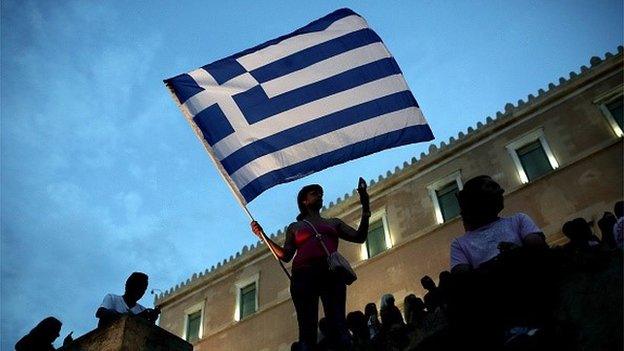How long to Greek capital controls?
- Published

All over Europe regulators and politicians are preparing in case of failure by eurozone government-head talks that would avert default by the Greek government, and for a probable acceleration of withdrawals from Greek banks, a run in all but name.
The point is that Greek banks are very close to the absolute limit of how much they can be funded by the European Central Bank and the Bank of Greece - in that around a third of their lending and assets is financed by the respective central and national banks in this way.
If deposit withdrawals continue at the current pace, Greek banks will soon exhaust eligible assets they can pledge to the Bank of Greece for cash under the Emergency Liquidity Assistance (ELA) scheme.
That could happen in days, according to banking sources.
But even before that, the European Central Bank could turn off the ELA drip feed - because it is forbidden by its rules to allow the Bank of Greece to lend to insolvent banks.
If Greece's bailout talks collapse, it would be hard for the ECB to maintain the fiction that the Greek banking system is solvent - given that the value of a big chunk of banks' assets, including sovereign debt and tax-relief claims, depends on the solvency of the Greek state.
So the ECB would at that ill-starred juncture have to take the banks off life support.
And the Greek authorities would have no realistic option but to impose capital controls, or restrictions on how much cash can be withdrawn by customers from the banks.
As I said on the News at Ten last night, this would be a big step towards Greek exit from the euro, since free movement of capital is such a vital component of a monetary union.
It would also cause jitters all over the eurozone, partly because Greek banks have branches and subsidiaries scattered across the world, and partly because investors in banks in more vulnerable eurozone economies would think twice about leaving their cash in the banks of those economies.
If you are a business or well-heeled investor, why would you keep your cash in a Portuguese, Spanish or Italian bank, over the long term, if Greece provides an example of how that cash can be frozen?
So capital may not take flight from these other eurozone economies tomorrow if Greece heads towards the euro exit. But it may over time seep out, in a costly and economically damaging way.
As for savers in the overseas branches and subsidiaries of Greek banks, this looks like a manageable potential headache for the authorities.
As I understand, there are perhaps a few thousands British-resident savers in London based branches of Greek banks - so there are a relatively small number of people in the UK whose savings could in theory be vulnerable to the questionable capacity of the Greek government to act as backstop to a deposit protection scheme.
Also cross border loans to Greek banks by other eurozone banks have been cut to almost trivial levels.
Or to put it another way, the weakness of the Greek banking system is highly unlikely to cause an immediate eurozone financial crisis.
But over the longer term it would undermine the cohesion and integrity of the euro - and, as I have said frequently and tediously, would increase doubts about whether the euro is forever.